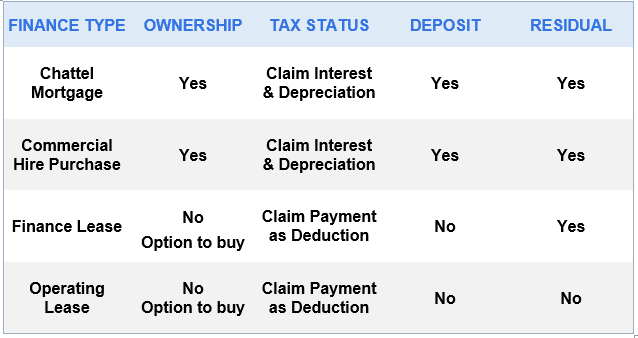The Fundamentals of Asset Finance
Financing business assets can provide ongoing value, when done right. Before diving into different structuring options it is best to have a grasp of asset financing fundamentals. Unfortunately, many businesses get this wrong and make decisions without considering the long term impacts.
i) The Asset Life Cycle
Before you even think about buying and financing any assets, think it about its life cycle first.
The asset life cycle relates to the time over which the asset will contribute to business operations. More broadly, the full asset life cycle refers to the acquisition, use and disposal of the asset within the business. The main aim of asset life cycle management is to reduce costs and increase productivity.
Businesses with larger, complex asset needs will use Asset Management Software to assist with managing asset life cycle.

ii) Debt Structure
Asset or Equipment Finance is often more flexible than longer term financing structures such as mortgages. This means a better ability to align repayments to suit cash flow and working capital management.
As outlined above, the term of the loan and its repayment program need to align to the asset's life cycle. This practice ensures that the repayment of the debt on the asset is finalised before the asset no longer exceeds its life cycle and value to the business.
All too often, a business will be left making payment on an asset that is no longer in use, while also needing to acquire a new asset to replace the aged asset.
TIP: Often where business go wrong is funding long term assets with short term financing facilities or vice versa.
Types of Asset Finance Options
The differences in financing structures appear subtle and indeed repayments look similar, but they can be significantly different from an accounting and tax perspective.
Most structures allow 100% of the purchase price to be funded, secured by the asset itself, with a fixed loan term. The comparisons between the four main structures is explained below:

Asset Finance Types Explained
1. Chattel Mortgage
Often used in vehicle finance. In a chattel mortgage, you take ownership of the asset and the financier takes their interest over it by way of mortgage. Once the contract is completed, the security interest is removed giving the customer clear title to the vehicle.
Potential Benefit – For businesses registered for GST on a cash basis, they may claim back GST in full in their next Activity Statement. The business has certainty of ownership and ability to contribute a deposit upfront to reduce repayments and loan term.
2. Commercial Hire Purchase
The financier purchases the asset on behalf of the customer and then hires it back over an agreed term. After the residual is paid, the customer assumes ownership.
Potential Benefit – Offers some certainty of ownership at end. Is generally less tax effective than a Chattel Mortgage option. Currently not a widespread product option.
3. Finance Lease
The financier retains actual ownership of the asset with an option to purchase at the end of the term.
Potential Benefit – A good option if you update equipment or vehicles on a regular basis. The financier retains ownership of the asset, so only the purchase is financed excluding GST. The business may not want to assume immediate or delayed ownership for legal or accounting reasons.
4. Operating Lease
The business will not own the asset at any point. This is commonly referred to as being “Off Balance Sheet” and the goods can be returned at the end of the term. Generally this structure is delivered at a higher cost.
Potential benefit – An option when you are turning over equipment regularly, need greater flexibility and want one simple repayment.
Tax Considerations
The taxation treatments associated with ownership of equipment can be unique to the business needs and circumstances.When considering debt of any kind, you also seek accounting advice.
Specifically consider whether the benefits associated with asset ownership of equipment outweigh any benefits of a full deduction of payments through leasing.
Your commercial broker has the skills to assess your asset finance needs with other financing considerations. Ask for advice today.

